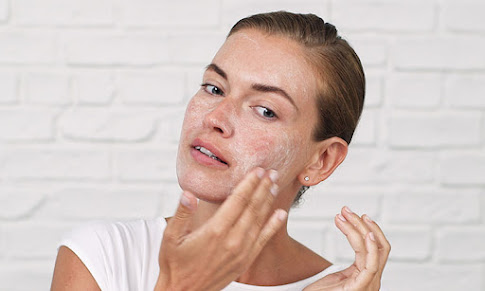How to Properly Exfoliate Your Skin
How to Properly Exfoliate Your Skin
From loading up on antioxidants to investing in laser skin resurfacing, there are many ways to get the smooth, glowing, healthy skin we all want. Exfoliation remains among the best ways to improve your skin’s texture and tone, and it’s something all of us can do right at home. However, it’s also easy to overdo it by exfoliating too often or using the wrong method for your skin type.
In this ultimate guide, discover why it’s so important, as well as how to properly exfoliate your skin with expert tips from Dr. Magovern (board-certified dermatologist and owner of Manhattan Dermatology).
Why You Should Exfoliate Your Skin
Your skin is constantly repairing and replacing itself. Because of this, you can be left with layers upon layers of dead skin all over your body. Here are 5 key benefits of exfoliation, which helps to make way for brighter, smoother skin:
- It fades age spots
- It makes fine lines and wrinkles look less visible
- It allows for better absorption of moisturizers, antioxidants and collagen-boosting serums
- It unclogs your pores
- It minimizes pore size and superficial scars
Finally, if you have acne-prone skin, exfoliation can help clear clogged pores, which often lead to breakouts, and minimize their size. It can also help fade acne scars faster by accelerating skin cell turnover and stimulating collagen production.
What Type of Exfoliant Should You Use?
So, you now know how important it is to exfoliate—but there are a few things to consider when it comes to how you do this. In fact, there are two ways to exfoliate your skin: chemical exfoliation and manual exfoliation. Here we’ll explain what each one is in more detail, as well as help you decide which one will work best for you.
What is Chemical Exfoliation?
“Chemical exfoliation uses ‘chemicals’ to break down the surface skin cells,” says Magovern. As a general rule of thumb, highly sensitive and acne-prone skin responds very well to chemical exfoliants, as they are less likely to cause irritation. “I prefer chemical exfoliation with glycolic acid, lactic acid, mandelic acid or even using products that contain fruit enzymes, such as papaya, pineapple or pumpkin (as they tend to be gentler),” Dr. Magovern tells us. “Additionally, chemical exfoliators are nice because you usually don’t need to scrub, plus you get the benefit of something like glycolic acid, which can stimulate collagen production and trigger other anti-aging pathways. Salicylic acid targets oil glands, which can improve acne. I’m sure there are products out there with a combination of both (such as glowMD perfect scrub).”




Comments
Post a Comment